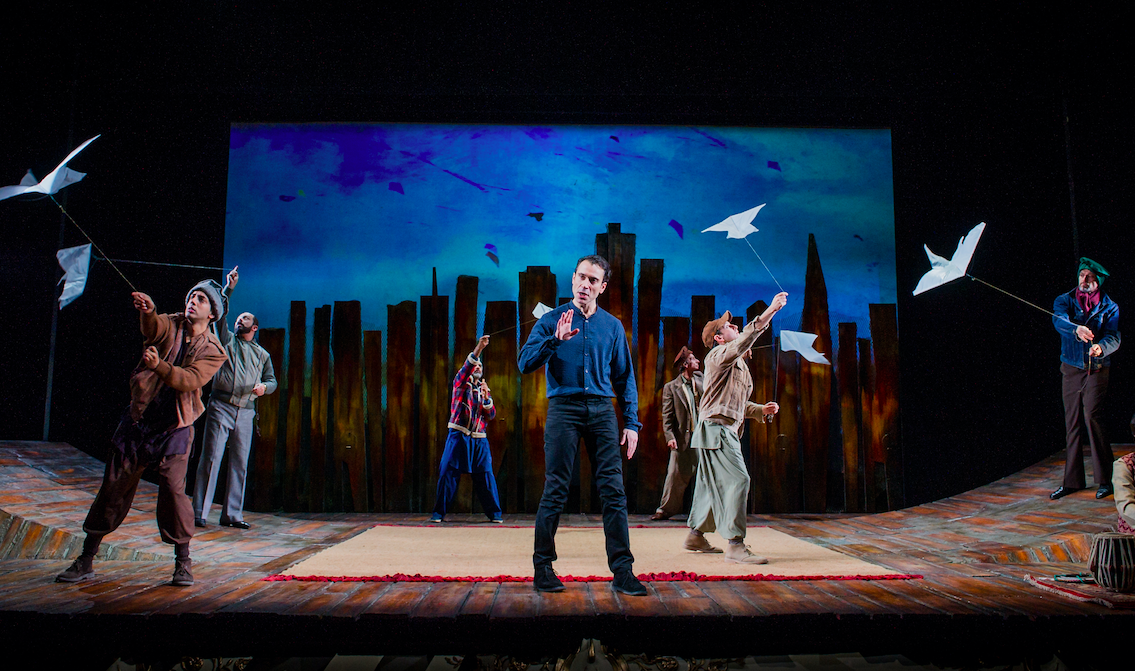Transferring a novel to the stage, particularly one as distinguished and beloved and as Khaled Hosseini’s ‘The Kite Runner’, requires sensitivity and an authoritative creative vision. Matthew Spangler’s timely production, under the direction of Giles Croft, excels in exploiting the opportunities of the stage, stripping Hosseini’s tale of friendship, fatherhood, and redemption to the essentials, with invigorating results.
A play will not have the subtle, cumulative effect of hundreds of pages of prose consumed over several days. Spangler accepts this, but the decision to have Amir (Raj Ghatak) present onstage, narrating his life throughout, and reflecting retrospectively on the characters who shaped him, efficiently conveys the idea threading Hosseini’s novel together: that a person is formed by his experiences, and must be judged by his relations to others. This sense is also rapidly transmitted within the first seconds, with Spangler’s placing of Hassan (Jo Ben Ayed), Baba (Gary Pillai) and Soraya (Ameira Darwish) onstage as Amir begins his monologue recounting his ‘formative’ years.
One initially jarring aspect is the way in which Amir, meant to be a boy enacting Westerns in his garden in Kabul, is wearing the stubbornly middle-aged combination of a white shirt tucked into trousers favoured by off-duty solicitors. But perhaps this is the point; the audience must consider the professional, Californian Amir of the present day as the child dragged from innocence by the abuse of his closest friend, racial intolerance, and war. Amir’s San Francisco drawl switches to Farsi in the initial scenes depicting the fiercely loyal friendship between himself and Hassan, the latter played with a haunting, almost ethereal innocence by Jo Ben Ayed. Leaping between languages like this reminds us of the layers of Amir’s cultural identity, an element very well suited to theatrical interpretation. The character of Baba, interpreted by Pillai in a stand-out performance, is similarly enhanced by stagecraft. The shock of Baba’s transition from the distant, irritable entrepreneur to a man reduced to ‘two suitcases and one disappointing son’, ultimately emerging as a father so devoted that his last act is to cling to life long enough to see the marriage of his son, is effectively compressed into two hours.
Perhaps why this production works so well is because of Spangler’s observation that in the novel, Amir’s first-person narrative is a cathartic, confessional process. It is one that, in retrospect, cries out for dramatization, the result of which is Amir’s unifying monologue. There is a greater sense that the character reaches maturity by articulating his guilt than in the novel, and his elation in redeeming himself, finding the ‘way to be good again’, has a choreographed exuberance prose cannot achieve.
There are elements of the plot that would have no doubt posed initial concerns for Spangler and Croft: the rape of Hassan, his murder, the staging of the kite runners of Kabul. The first two of these elicited the revulsion, then seething outrage, of every audience member. Transmitted through disturbing silhouette, these scenes illustrated the essential inhumanity of such atrocities: the attackers are devoid of character, reduced to sociopathic phantoms.
Whilst successfully tackling the upsetting material, Croft’s production has a lightness that saves the audience from complete despair. Ghatak’s delivery of the monologue is sensitive to the gentle humour which hallmarks Hosseini’s fiction: describing Baba’s slavish devotion to Reagan, and his pleasure at finding an English term to describe Assef (Soroosh Lavasini): ‘sociopath’, are examples of this and act as respite to the unashamedly disquieting moments. The joy of the wedding scene, set to the Afghan song Ahesta Boro, similarly elevates the mood and offers a sense of spectacle that a novel could not achieve. Most uplifting, and most masterfully staged, is the depiction of the freedom that Amir attains in shedding his psychological burden in rescuing Hassan’s son. In the closing scene of eponymous kite running, the sound effects, generated by cast members spinning schwirrbogen, a rattle-shaped instrument that whistles like the wind, were absorbing and successful in mirroring Amir’s frenzied joy. Composer Jonathan Girling described the onstage tabla player, the musician Hanif Khan, as the ‘next most important person’ in ‘The Kite Runner’. Khan’s performance, which begins as the audience enters the theatre and ends only at the curtain, the man sitting onstage for the full two and a half hours, gives the tale cohesion and the emotions an urgency.
One flaw in the production is its time constraints. In the novel, for example, the shock of the news that Hassan is Amir’s brother, and the distress produced by Zorab’s suicide attempt, build up over several paragraphs, and readers can flick back to alter their interpretations and refresh themselves of foreshadowing events. Compressing such revelations into seconds, regardless of characters’ outraged dialogue, does lose this effect, and it may be that the audience does not receive sufficient time to process such information; but there is little a dramatist can do to alter this. Spangler’s stage adaptation is unashamedly that: it stands alone as drama– myself and a friend who had never read the novel were equally engrossed – offering a fresh and timely revision of Hosseini’s classic.



